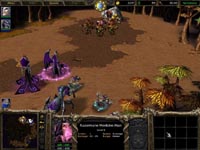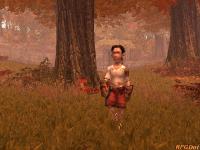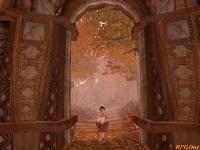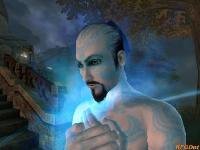|
|
|
Main News Forums Games Games Database Top 100 Release List Support Files Features Reviews Previews Interviews Editorials Diaries Misc Download Gallery Music Screenshots Videos Miscellaneous Staff Members Privacy Statement |
Fable Review
Expectation is a bitch. When Peter Molyneux declared nearly four years (!) ago that his studio was going to develop the "greatest RPG of all time," the then titled Project Ego was given a near-impossible benchmark to reach. Whether your personal tastes would have Fable compete with Ultima, Wasteland, Fallout, Planescape: Torment, Morrowind, or Gothic (or any of a number of others), Molyneux's ambition, from the beginning, was likely to outreach his abilities to get something truly original, exciting, ambitious, and fun developed in this time of sequels and proven commodities. However, it's useless to approach Fable based on what it was intended to be - yes, many features discussed in interviews over the past four years have disappeared, the scope of the game has significantly narrowed, and the game is far from the greatest RPG ever made, although that, in and of itself, is not necessarily a failure. Genre-blending? Nope, basically just an Action-RPG. Fable, in the end, is a very short, fairly straightforward action-RPG that takes place in a fairly standard fantasy world called Albion. Within these trappings, however, there are some inventive and interesting additions to the gameplay that lift the concept, if not the execution, of Fable above essentially similar games like Baldur's Gate: Dark Alliance or Champions of Norrath. In Fable, you begin the game as a child, living peacefully in a small town, before bandits raid the town, kill your family and attempt to kidnap you. This early game gives you a chance to get acquainted with the simple controls, and an opportunity to experiment with alignment choices. Pretty soon, you're a teenager, training to be a hero, and within an hour or so, you'll be moving onto adulthood, where your choices really start to determine who your character is.
Alignment has long been touted as one of the main attractions of Fable, and though it tries to expand the basic "are you good or evil" system of games like Star Wars: Knights of the Old Republic, it ends up about the same in practice. Many of the big moral decisions just come down to a question of: do you kill or have mercy? However, it does improve on the formula a bit, in the sense that everything you do has a small effect on your alignment - maybe you steal things when no one is around, but you also save fair maidens. That's just fine, but you won't be as holy as a Hero who respects other's property. There are lots of little examples like this, where you can be a little bit good, or a little bit bad, and it does actually have an effect on your overall alignment. The problem is that your alignment - in direct contrast to Fable's "For every decision a consequence" design manifesto - really has little to do with how the game plays. If you're good you get a halo and butterflies hovering around you, and everyone will love you; if you're evil you get horns and glowing red eyes, and the fear and respect of villagers big and small. But the game, no matter what your decisions, will play on much the same either way. The end-game will play out a little differently if you're a murderous cur, but similarly to the multiple endings in a game like Deus Ex, the end result has more to do with your last minute decisions than with the way you've handled yourself the rest of the game, which makes the open-endedness feel a bit like smoke and mirrors.
Fightin' Mostly what you'll do is fight, which makes it a good thing that the mechanics of the game are simple, fun, and easy to master. Combat is fast and visceral - once you've locked onto an enemy with the L trigger, just hack away with X, and once you've gotten a few hits in, a special attack will become available on the B button. You can also block (and roll), or attack long-range with a bow or crossbow, either by locking on an enemy, or with a first-person aiming scheme that is a whole lot of fun (can you take a bandit's head off at 50 paces? It's sure worth a try). Magic is similar - you lock on an enemy, hold down the R trigger to access your spells, and cast away. The combat looks great, with the spell effects being especially impressive, and enemies are fairly intelligent - they use cover, long-range weapons, and flanking attacks to try and get the better of you. But usually they won't. Fable is - in addition to being quite short - very easy. Food and health potions can replenish your energy instantly in combat, via the D-pad, and readily available Resurrection vials will instantly bring you back to life when you die, if you have any in your inventory (which you will; they're plentiful enough that you probably won't even have to buy them). That aside, you'll quickly become quite powerful, and will deal massive damage to most any enemy. The only challenge to speak of is in the last couple of boss fights, and even these are just a matter of figuring out a pattern. Suffice it to say, you probably won't need to reload much. The biggest challenges are in some of the secrets and optional side-quests - the treasure hunt, Demon Doors that only open after you've figured out their riddle and satisfied the challenge, the search for silver keys and the chests that they open.
A big downside of the simple and easy combat is that it renders a lot of the different weapon and armor choices pointless. Similar to Dark Alliance 2, you can upgrade your weapons with various effects, and make them more powerful, and this is fun and satisfying to do. However, once you've found a weapon you like and can afford it (which will happen pretty early if you're good at any of the mini-games like Pairs), there's little reason to upgrade - you'll find lots of great stuff, but you'll likely stick with what works, because the easy combat won't give you any good reason to switch. Speaking of mini-games, these are a great addition to the overall experience. Basically, there are taverns at a number of small towns that give you a chance to make some money (and they're also essential to one side-quest). You can play Blackjack, Coin Golf, Pairs, and a number of other games, each unique to a particular tavern location. The Other Stuff Although there are no dialogue choices in the game - in fact, you never speak - there is ample opportunity to express yourself - both through your actions and choices, and through one of the game's most promising innovations, Expressions. Expressions allow you to, for example: fart, belch, flip people off, say thank you, apologize, boast, pose, preen, yell, flirt…. And so on. Some Expressions will become available to you very soon after beginning the game, some are learned by alignment, and some are learned through experience and renown (more on that later). And while using Expressions with some of the games many NPC will yield both interesting and amusing results, this portion of the game feels rather flat - it comes off like a weak version of The Sims, with the only necessary function of Expressions being that of romance and marriage.
Yes, another feature touted in Fable is the ability to get married - and within this gameplay element are some original and impressive features. Your wife will react well to more attention and poorly to less. She'll comment on changes in your appearance and give you gifts when you come home from a long journey. If she catches you screwing around, she may divorce you and talk trash about you at the local tavern. And while all this is interesting and worthwhile, it feels more like a mini-game, a slight diversion from the basically linear path of Fable, as opposed to a fully implemented part of the game. This is one of the main problems with Fable - the game is a fairly straightforward, completely linear, and very very short path through the main story, despite some small diversions. That story is, for the most part, well written and scripted, but the amazingly short length (think 10 - 15 individual quest sections, with the last 5 or 6 each leading directly to the next; or for a direct comparison, think about 20% of Knights) means that you never really have a chance to step into the life of the hero and care about his motivations. The story just jumps quickly from main plot point to main plot point, with no downtime or fleshing out of the characters or story. There are several side quests, but they are mostly simple tasks that seem inserted mainly to give you a few more chances to choose good or evil - for example, bandits are planning to raid a merchant caravan; you can choose a quest to help the bandits, or help the merchants fight off the bandits. Once you've finished the main story, you can continue to adventure in Albion, and there's some motivation to do so in the form of secrets and small side-quests, but on the whole, the game probably won't hold your interest much longer than the 15-20 hour mark. In addition, the people see blissfully unaware that you've saved the land, and the Hero's guild, where you take quests for the main part of the game, is mostly destroyed, never (apparently) to be rebuilt. It sure does look good… One area in which Fable is unparallel is its visuals. The game is always visually impressive, and quite often breathtaking, and every area in the fantasy world of Albion is crafted with care. Beams of light come down in the forest, leaves drift slowly to the ground, there's a full day/night cycle made even more impressive by the actions of NPCs - they gather in the tavern after hours as the guards light the lamps; houses are closed and shuttered where they were open in the daytime, and shops are closed until morning (although you can break in…). You can't roam free over the countryside, but much as in Knights, you won't really mind - the areas, though small, are well crafted and feel very alive. Spell effects and characters look excellent, and the changes in the Hero over time are great - you'll scar from combat, get fat from eating too much, and get older no matter what you do. You can also alter your hair and get tattoos, and wear a number of different outfits (or none at all!). All in all, it's a visual experience to be admired on every level. Meanwhile, the sounds of Fable also do a great job at drawing you into the experience - in fact, the game is at its best when you pull on a pair of headphones and sink into the world of Albion. Your boots sound different on different surfaces (snow is especially cool sounding), each weapon makes a satisfying and deadly impact, and the ambient noise is perfect in just about every situation. So… what? Full disclosure: I wanted to love Fable. Many of its ideas are incredibly original and creative, and properly implemented, have the potential to bring new life to the RPG genre. The game is undeniably fun to play, and one of the most beautiful experiences to be released on the Xbox to date. But whatever experience you might hope to get out of Fable, it's hard not to be disappointed on some level with the end result. The game is far too short for anything but a FPS, and that's if you spend a lot of time messing around - if you only performed the main quests, you could conceivably be done with Fable in 7 or 8 hours. It's not enough of a challenge to be a great action game, and there's not enough to do, or enough freedom to do it, for it to be a great RPG. The game is still well worth playing, but it's hard to shake the feeling that with a little less focus group testing, a bit more story and side questing, and a little more nerve, it could have been incredible.
Rate this title and view comments Game Info Printer Friendly Version |
|||||||||||||||||||||||||||||||||||||||||
|
All original content of this site is copyrighted by RPGWatch. Copying or reproducing of any part of this site is strictly prohibited. Taking anything from this site without authorisation will be considered stealing and we'll be forced to visit you and jump on your legs until you give it back. |
||









